News
Constitutional Law expert: Trump will be an “illegitimate” President given he’s barred from office by 14th Amendment

Trump engaged in an insurrection
Imagine a very popular 25-year-old–who was born in another country–won the election for U.S. President and was sworn in. Would that election victory override Article II of the US Constitution that mandates, “No person…shall be eligible to the Office of President” if not a “natural born Citizen” and having “attained to the Age of thirty five Years”?!
Of course not. The only way that person could be a legitimate President is if those provisions of the Constitution were amended before taking the oath of office. The real-world impact would be that any actions taken by this constitutionally barred person while in office would be invalid.
That’s not just my view but also instructively the analysis provided by constitutional law expert John Bonifaz—who serves as President of Free Speech For the People, a non-partisan organization dedicated to defending our Constitution.
With respect to Donald Trump, Bonifaz explained bluntly that given the court rulings finding Trump engaged in an insurrection in violation of Section 3 of the 14th Amendment, he will be an illegitimate president–unless Congress votes before he is sworn in to lift this constitutionally mandated prohibition.
Taking a step back, I have written repeatedly over the past few years that Trump engaged in an insurrection with his attempted coup and Jan. 6 attack. In August 2023, I even led a campaign urging people to email their Secretary of States urging them to disqualify Trump from the ballot. This issue has always been one of vital importance to me given it’s about protecting our nation from a man who attempted a coup and incited a terrorist attack.
Thankfully, the Colorado Supreme Court in December 2023 ruled that Jan. 6 was an “insurrection” as defined by Section 3 and Trump “engaged” in that insurrection. The court, thus, concluded that Trump is “disqualified from holding the office of President.” (It’s important to note that this court ruling was not focused on Trump being on the ballot—but being barred from holding the office of President.)
Bonifaz’s own organization has also led the charge to bar Trump in other states, with judges and election officials ruling Trump “engaged in insurrection” in violation of the 14th Amendment. And while the US Supreme Court ruled in March of last year that States could not bar Trump from the ballot—only Congress could—they did not overturn the ruling of the Colorado Supreme Court that Trump had “engaged in an insurrection.”
Those are the facts. That means—as Bonifaz explained-Trump is disqualified from office for engaging in an insurrection. The only way Trump could be legitimately sworn in is if two-thirds of the Senate and the House both vote to remove that constitutional bar—as the 14th Amendment proscribes.
If Congress does not act, as Bonifaz stated, there is “no question about it, Trump will be an illegitimate President.” Yes, Trump will be an illegitimate President! What that means in the real world, Bonifaz continued, is that “every action Trump takes will be illegitimate and will be subject to a Federal court challenge.” Bonifaz warned such a scenario is “putting ourselves in uncharted territory here given we have a provision of the constitution that clearly disqualifies Trump from office.”
In addition, Bonifaz is urging members of Congress during the Jan. 6 certification of the 2024 results to uphold the Constitution and object to Trump’s victory citing the disqualification clause of the 14th Amendment. The recent revisions of the Electoral Count Act requires 20% of members of the House and Senate to object—up from just one from in each chamber. He continued that means “87 members of the House, 20 members of the Senate could, in fact, come together and say, we’re going to raise this question.”
Bonifaz pleaded with members of Congress “to uphold their own oaths and to defend the Constitution” by objecting on Jan. 6. He added passionately, “We don’t just throw out certain constitutional qualifications because it no longer feels politically right to do so. Rather, what’s politically right is to stand up for the Constitution today and to stand up for our democracy.”
He added another great point, reminding us we heard from, “Democratic leaders going into this election that Donald Trump is a fascist. We heard that Donald Trump is a threat to our Republic. We heard that Donald Trump is a threat to our democracy.” But he added: “What are we hearing now? Crickets. We’re not hearing that anymore.”
Of course, in the real world we know that even if 20% of Democrats in House and Senate forced a vote on disqualifying Trump, since the GOP controls both chambers, it will not succeed. But that doesn’t mean Democrats should ignore our Constitution. They should stand up and fight–even if this specific battle might be unwinnable. The Democratic base wants fighters-not people who sit by while our Constitution is being violated.
However, regardless of what Congress does, we have a role to play from a political point of view. We should all refer to Trump as an illegitimate President. After all, this is the same Trump who sought to delegitimize President Obama with his racist birther campaign. Then he sought to delegitimize President Biden with election fraud lies. And this is the same Trump who repeatedly lied that he won the 2024 election in a “landslide” who has a “mandate.”
In this case, we have the U.S. Constitution on our side. Trump engaged in an insurrection and is thereby barred from office. We shouldn’t care that MAGA is fine with an insurrectionist as their leader. To us, Trump will always be an illegitimate President who should not be heading to the White House. Rather, he rightfully should be reporting to prison.
You can watch my full interview with constitutional law expert John Bonifaz discussing why Trump is barred and will be an illegitimate President below:
News
“I think yes”: Biden believes he would have won election over Trump had he stayed in the race

When asked if his health would have held up to four more years of the presidency, Biden said “Who the hell knows?”
President Joe Biden thinks he had the juice.
The outgoing president speculated that he would have beaten President-elect Donald Trump a second time had he stayed in the presidential race in 2024. In a wide-ranging interview with USA Today, Biden was adamant that he would have fared better than Vice President Kamala Harris but balked on whether he could have served for four more years.
“It’s presumptuous to say that, but I think yes,” Biden told the outlet when asked if he would have won in November. “When Trump was running again for reelection, I really thought I had the best chance of beating him.”
Biden was less confident about making it through a second term. He said he considered “pass[ing] the baton” because he “wasn’t looking to be president when I was 85 years old, 86 years old.”
“Who the hell knows?” Biden said when questioned directly about whether he would have held his hypothetical presidency through 2028.
Elsewhere in the interview, Biden speculated about how his presidency would be remembered and advocated for what he viewed as the strengths of his administration.
“I hope that history says that I came in and I had a plan how to restore the economy and reestablish America’s leadership in the world,” Biden said. “That was my hope. I mean, you know, who knows? And I hope it records that I did it with honesty and integrity, that I said what was on my mind.”
News
BREAKING: Mexican President Claudia Sheinbaum Claps Back After Trump Suggests Renaming Gulf of Mexico to “Gulf of America” with Bold Renaming Proposal of Her Own!
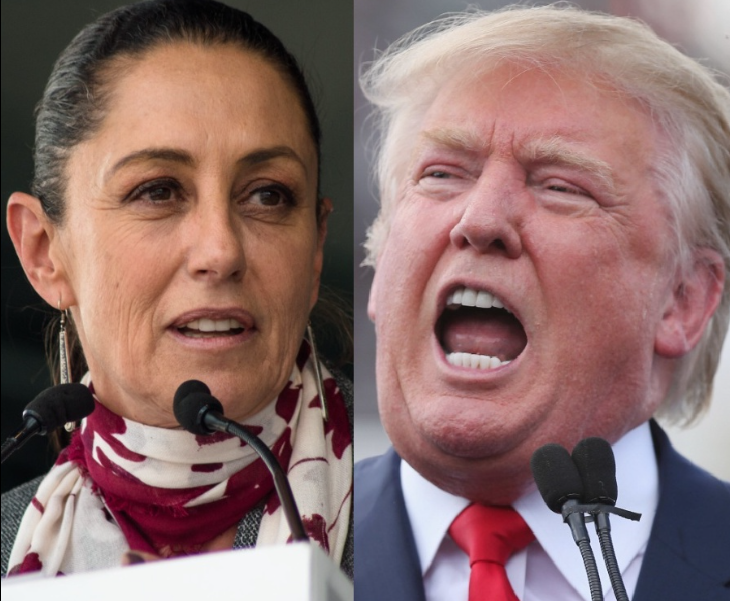
Mexican President Claudia Sheinbaum hits back hard after Donald Trump absurdly suggests renaming the Gulf of Mexico to the “Gulf of America” by suggesting some renaming of her own.
This is how you handle a man-child like Trump…
“I mean obviously, ‘Gulf of Mexico,’ the name is recognized by the United Nations, an organism of the United Nations. But next, why don’t we call it ‘Mexican America?’ It sounds nice, doesn’t it?” Sheinbaum said at a press conference.
She then waved at a map showing that North America was historically referred to as “Mexican America” before the rise of the United States.
“Since 1607 The Constitution of Apatzingán was for Mexican America, so we’re going to call it ‘Mexican America,’ it sounds nice, doesn’t it?” she went on. “And Gulf of Mexico, well, since 1607 and it’s also recognized internationally.”
Brian Winter, vice president of the Council of the Americas, praised Sheinbaum’s remarks—
“Humor can be a good tactic, it projects strength, which is what Trump responds to. It was probably the right choice on this issue,” he said.
“Although President Sheinbaum knows it won’t work on everything — Trump and his administration will demand serious engagement from Mexico on the big issues of immigration, drugs and trade,” Winter added.
Incidents like this reaffirm what a huge mistake the United States made be reelecting Trump. We are transitioning from stable, sane governance to the egomaniacal ravings of a reality TV star.
The world is laughing at us.
News
Trump’s trolling and tariffs sped up Trudeau’s demise. How will Canada handle him now?

Liberal Party infighting over Trudeau’s handling of the president-elect and his threat of tariffs dealt a final blow to the prime minister’s premiership. What now?
Canadians woke up Tuesday to an uncertain future, after Prime Minister Justin Trudeau said he would resign and bring his near-decade in power to an end.
Trudeau’s announcement came just days into an election year and followed weeks of mounting pressure from within his own party to step down as he battled dire poll ratings partly driven by soaring inflation, rising immigration and his handling of President-elect Donald Trump.
“If I’m having to fight internal battles, I cannot be the best option” in Canada’s next election, Trudeau, 53, told reporters in Ottawa.
His decision has triggered an urgent search within the Liberal Party to identify a new candidate who can take on Conservative leader Pierre Poilievre. Poilievre has dominated in the polls and was last on 44% according to the Canadian Broadcasting Corporation, compared with Trudeau — whose rating sits just above 20%.
The Trump factor
A key focus for whoever leads Canada next will be managing their country’s relationship with the incoming Trump administration.
After winning re-election in November, the president-elect vowed to impose a 25% tariff on all products imported from Canada and Mexico.
While Trudeau sought to appease Trump, visiting him at his Mar-a-Lago estate in Florida, the incoming president has since repeatedly jabbed at the prime minister, suggesting making Canada the 51st state and reiterating the idea in response to Trudeau’s resignation.
Trudeau’s handling of Trump precipitated the final blow to his tenure, with the high-profile departure last month of his Deputy Prime Minister and Finance Minister Chrystia Freeland. In a scathing resignation letter, she accused Trudeau of failing to take seriously Trump’s threats to increase import tariffs on Canadian goods.
Freeland warned that Canada needed to take Trump’s plans “extremely seriously” and avoid “costly political gimmicks.”
In contrast to Trudeau, Poilievre — the former-Conservative minister’s biography touts him as a “life-long conservative” and “champion of a free market” — has sought to present himself as the candidate with the “strength and smarts to stand up for this country.”
In an interview with Canadian broadcaster CTV News last month, Poilievre said that his first message for the incoming president was “that first and foremost, Canada will never be the 51st state of the U.S.” — and Canada, he said, had a “very proud future ahead of us.”
Tari Ajadi, a politics professor at McGill University in Montreal, was less sure. He told NBC News that Poilievre has yet to produce a clear plan on how to tackle the Canada-U.S. relationship under Trump, adding that “I think Canada’s in for a rough ride.”
What happens now?
Even though Trudeau is quitting, Canadians will have to wait for months before they can head to the polls.
An election date has yet to be announced, and while the Canada Elections Act says it must be held on or before Oct. 20, Trudeau’s resignation means it’s likely that a vote will be called before then.
Before that can happen, the Liberal Party must find a candidate. Trudeau said he would remain at the party’s helm until his party colleagues have undertaken a “robust, nationwide, competitive process” to find his successor.
In the meantime, Trudeau said Canada’s governor general had accepted his request to prorogue Parliament, suspending proceedings without the dissolution of parliament, until March 24. Then, a confidence vote is expected to be held, with a no-confidence result triggering the next federal election.
That means the Liberal government will remain in power, but parliamentary activity will come to a halt.
Referring to his party’s lack of working majority and Canada’s legislative gridlock, Trudeau said Monday that “Parliament has been paralyzed for months after what has been the longest session of a minority Parliament in Canadian history.”
Who will replace Trudeau?
Trudeau, a former teacher who campaigned with the slogan “sunny ways,” took office in November 2015 and enjoyed high popularity ratings early in his leadership with the promise of liberal reforms, progressive tax policies and a focus on gender equality.
His initial appeal was also boosted by the legacy of his father, the charismatic but polarizing Pierre Trudeau, who was one of Canada’s longest-serving leaders.
But in recent years, Trudeau’s approval ratings plummeted from around 65% in September 2016 to around 22% in December, according to the nonprofit Angus Reid Institute.
According to figures from the Angus Reid Institute, Freeland, a former journalist, is the Liberal candidate most likely to beat Poilievre.
Former Bank of Canada governor Mark Carney is also a contender, and the Conservatives have sensed that. They have long attacked Carney, with Poilievre dismissing him as “just like Justin.”
But regardless of who Trudeau’s successor is, “it’s hard to imagine anyone coming in who can hold on to the government in the next election,” Cornell University government professor Peter Loewen.
-

 News3 weeks ago
News3 weeks agoU.S. Military Service Is the Strongest Predictor of Carrying Out Extremist Violence
-

 Uncategorized3 weeks ago
Uncategorized3 weeks agoBREAKING: Kylie Kelce hits back hard after MAGA trolls swarm her with hatred for daring to dethrone Joe Rogan as the #1 podcaster in America.
-
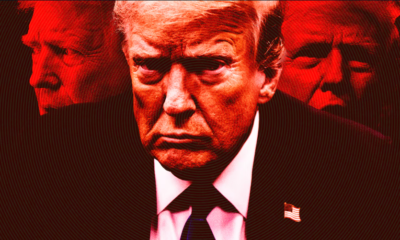
 News2 weeks ago
News2 weeks agoTrump Blames ‘Deranged’ Enemies for Hush Money Case in Posts
-

 News3 weeks ago
News3 weeks agoMerchan: Trump will be sentenced
-
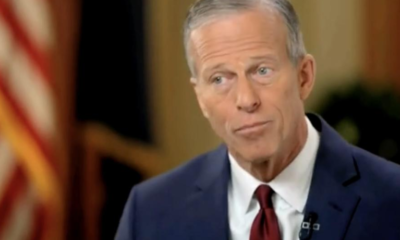
 News2 weeks ago
News2 weeks ago‘Is It Realistic?’: Top Republican Casts Doubt on Trump’s Deportation Quest
-
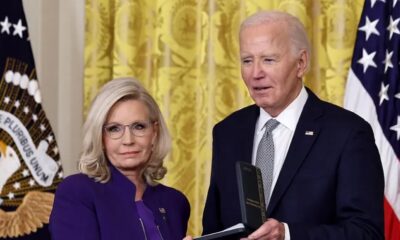
 News3 weeks ago
News3 weeks agoMAGA “offended” at Liz Cheney award
-
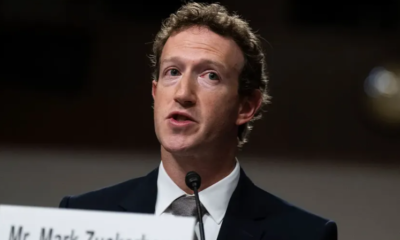
 News2 weeks ago
News2 weeks agoMark Zuckerberg tells Fox News that Meta will “get rid of fact checkers” in latest appeal to Trump
-
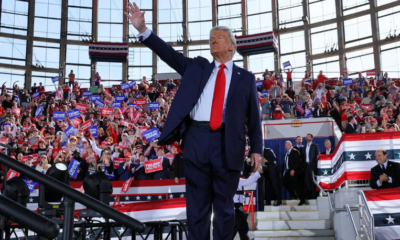
 News2 weeks ago
News2 weeks agoFailing to tell the central story’: Reporter reveals what media misses in Trump coverage






